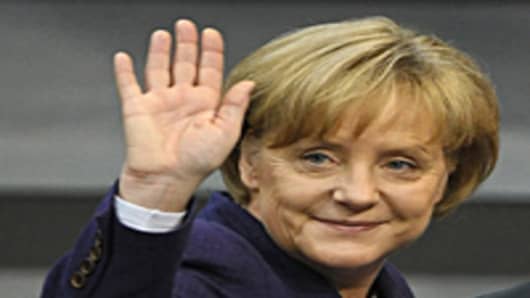The pressure for Germany to reverse its defiant course on issuing euro bonds continued to grow on Tuesday, one day before a dinner meeting of European leaders. But German officials remained adamant that there was no way they would bend on collective debt, even if the new French president, as expected, makes it a dining-room topic.
Angela Merkel, the German chancellor, finds herself increasingly on the defensive over the bonds, which she opposes as a near-term remedy for the region’s financial woes. But proponents say that bonds jointly issued by the 17 members of the euro currency union are the best long-term solution to a crisis that has destabilized global markets and threatened the future of the currency.
Merkel is expected to face a growing front led by President François Hollande of France when she travels to Brussels on Wednesday for the informal meeting of European Union leaders. Whether or not Hollande wins the argument, he has helped change the nature of the debate.
After a focus for months on cutting spending and budget deficits, the discussion has shifted to ways to bolster growth. Many economists and policy makers now say that the surest way to end the crisis is for European states to move toward jointly issued debt, known as euro bonds.
The sense of crisis escalated Tuesday, as the Organization for Economic Cooperation and Development cut its growth forecast for the euro zone and said Europe risked creating a self-sustaining cycle of decline that could have dire effects for the world economy.
Depending on the country’s perspective, euro bonds are either an old and particularly persistent rash (Germany and a few others) or an increasingly popular idea for addressing the region’s economic plight (almost everyone else). Although many details would need to be worked out, the idea is to have the euro zone countries collectively issue bonds that would be guaranteed by all 17 members. But the most creditworthy countries, like Germany, would almost certainly have their borrowing costs rise, as they, in essence, would guarantee the loans of their debt-saddled neighbors.
Though Merkel may be increasingly taking the minority position, she is not alone. Others arguing against euro bonds include Austria, Finland and the Netherlands.
“Euro bonds appear to be a straightforward solution, an easy answer to a very difficult question,” said Tanja A. Börzel, a professor of European Union politics at the Free University in Berlin. “The real question is whether this is politically feasible and even legally feasible in Germany.”
Euro bonds: 'the fatal path to debt union'
Conservative German state politicians from Merkel’s bloc put out a statement on Tuesday rejecting euro bonds, calling them “the fatal path to debt union.” When Germany’s constitutional court signed off on the euro zone bailout fund in September, it also appeared to rule out taking on collective debt.
In her public comments on euro bonds, Merkel has not completely dismissed them as a potential long-term solution. But a senior German official said that there was “no legal basis” for euro bonds and that they were “explicitly forbidden” by European Union treaties. The official, who spoke on the condition of anonymity about closed-door discussions, said Merkel’s position on euro bonds had not changed and was not likely to.
“I do not see euro bonds as a subject for tomorrow evening,” the official said. “Our position is well known.”
No major policy changes can happen without approval from Germany, Europe’s biggest economy and the last of the euro zone’s large countries to maintain a triple-A credit rating. Throughout the euro crisis, Merkel has pursued a strategy of standing firm until the last minute, before making small, tactical retreats. But euro bonds have been a red line for Merkel and her party.
Conservatives in Germany argue that allowing deeply indebted states to borrow more cheaply by piggybacking onto Germany’s top credit rating would also ease pressure on those countries to make long-term economic overhauls. They say that euro bonds might address the problem for a few years, but that eventually the overall indebtedness of the bloc would reach unsustainable levels, and the smaller states would pull Germany under with them.
Many in Germany believe that much of the pressure on Merkel to change course is about politics more than economics. Hollande faces parliamentary elections next month and needs to show French voters that he is standing up to the German chancellor. President Obama, who hosted leaders of the Group of 8 industrial nations last weekend at Camp David, wants Europe to contain its economic problems ahead of the November election.
While it is popular to talk about euro bonds, getting them off the ground would be another matter. Few believe that the Germans, or their allies in fiscal rectitude in Austria, Finland, the Netherlands and elsewhere, would endorse a blank-check form of debt issuance for the Greeks. Many argue that some kind of hybrid system is more likely.


